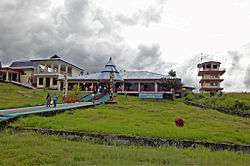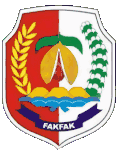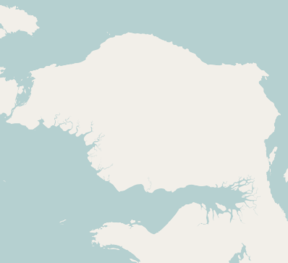Fakfak
Fakfak ([ˈfaʔfaʔ]) is a town in Indonesia and seat of the Fakfak Regency.[1] It had a population of 12,566 at the 2010 Census.[2] It is served by Fakfak Airport. It is the only town in West Papua with a Muslim Indian and Arab Indonesian presence.
Fakfak | |
|---|---|
Town | |
 Fakfak Airport | |
 Seal | |
 Fakfak Location of the town in relation to the Bird's Head Peninsula | |
| Coordinates: 2°55′0″S 132°18′0″E | |
| Country | |
| Province | West Papua |
| Regency | Fakfak Regency |
| Population (2010 Census) | |
| • Total | 12,566 |
| Time zone | UTC+9 (WIT) |
History
The former name of the settlement was Kapaur and it is still in use by biologists.[3] Historically Fakfak was a significant port town, being one of the few Papuan towns that had relations with the Sultanate of Ternate, being bound to it.[4] The Sultanate later granted the Dutch colonial government permission to settle in Papua, including in Fakfak.[5] The Dutch began settlement in 1898.[6] The town still has some colonial buildings remaining from this settlement.[5]
The Japanese 1st Detachment landed in Fakfak on April 1, 1942.[7] The small Royal Netherlands East Indies Army garrison surrendered without a fight and later a small garrison of 67 men of the 24th Special Base Unit occupied the area and used it as a seaplane base. Between April 1943 and October 1944, the town was attacked several times by allied bombers.[8] Japanese forces occupied the town until the end of the war in September 1945.
Fakfak is now an isolated town, not often used for the import and export of goods.[5]
Geography
Fakfak is located in West Papua, Indonesia, on the Bomberai Peninsula at foothills of Fakfak Mountains, near Tambaruni Bay.[6] It is situated in an area with many limestone hills, rivers and caves. As such, the streets twist and turn.[6][9]
Demographics
Fakfak has a small community of Muslim Arab and Indian Indonesians, descended from traders who came to Papua in the 19th century; this minority population has decreased recently due to Fakfak's diminishing role as a port town. It is the only place in West Papua with such a community.[5]
Cultural identity
Due to historically being under the control of Ternate but being located in Papua, Fakfak is torn between being pro-Indonesian or supporting the Free Papua Movement.[10]
Tourism
Fakfak has 1.5 kilometres (0.93 mi) of white sand beaches, located approximately half an hour from the town. Nearby there are also rock paintings. It is served by the Fakfak Airport.[6]
References
- Welt Atlas
- Biro Pusat Statistik, Jakarta, 2011.
- Onin Peninsula (Fakfak) The Papua Insects Foundation.
- Noor 2010, p. 4
- Noor 2010, p. 6
- Ver Berkmoes 2010, p. 785
- Pacific Wrecks
- https://www.pacificwrecks.com/airfields/indonesia/fakfak_seaplane/missions-fakfak.html
- Backshall 2002, p. 1022
- Chauvel 2005, p. 63
Bibliography
- Backshall, Stephen (2002). Rough Guide to Indonesia. London: Rough Guides. ISBN 1-85828-991-2. OCLC 59463950. Retrieved 13 July 2011.CS1 maint: ref=harv (link)
- Chauvel, Richard (2005). Constructing Papuan nationalism: history, ethnicity, and adaption. Washington, D.C.: East-West Center. ISBN 1-74104-830-3. OCLC 310400596. Retrieved 13 July 2011.CS1 maint: ref=harv (link)
- Noor, Farish (10 February 2010). "The Arrival and Spread of Tablighi Jama'at in West Papua (Irian Jaya), Indonesia" (PDF). S. Rajaratnam School of International Studies. Archived from the original (PDF) on 2011-10-01.CS1 maint: ref=harv (link)
- Ver Berkmoes, Ryan (2010). Indonesia. Footscray, Victoria: Lonely Planet. ISBN 1-932728-26-0. OCLC 61748548. Retrieved 13 July 2011.CS1 maint: ref=harv (link)